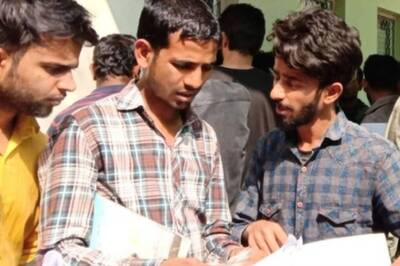
views
Sayyidul Istighfar Du’a
اللّهـمَّ أَنْتَ رَبِّـي لا إلهَ إلاّ أَنْتَخَلَقْتَنـي وَأَنا عَبْـدُكوَأَنا عَلـى عَهْـدِكَ وَوَعْـدِكَ ما اسْتَـطَعْـتأَعـوذُ بِكَ مِنْ شَـرِّ ما صَنَـعْتأَبـوءُ لَـكَ بِنِعْـمَتِـكَ عَلَـيَّوَأَبـوءُ بِذَنْـبي فَاغْفـِرْ ليفَإِنَّـهُ لا يَغْـفِرُ الذُّنـوبَ إِلاّ أَنْتَ Allahumma anta rabbi la ilaha illa anta, khalaqtani wa ana abduka, wa ana ala ahdika wa wa’dika mastata’tu. A’udhu bika min sharri ma sana’tu, abu’u laka bini’matika ‘alayya, wa abu’u bidhanbi faghfirli fa-innahu la yaghfiru adh-dhunuba illa anta. English translation: “O Allah, You are my Lord. None has the right to be worshiped but You. You created me and I am your servant. I am committed to Your covenant and promise, as much as I can. I seek refuge with You from the evil I have done. I acknowledge all the blessings You have bestowed upon me, and I confess to You all my sins. So, forgive me, for indeed, no one forgives sins but You.” Bangla translation: হে আল্লাহ! তুমি আমার পালনকর্তা। তুমি ব্যতীত কোন উপাস্য নেই। তুমি আমাকে সৃষ্টি করেছ। আমি তোমার দাস। আমি আমার সাধ্যমত তোমার নিকটে দেওয়া অঙ্গীকারে ও প্রতিশ্রুতিতে দৃঢ় আছি। আমি আমার কৃতকর্মের অনিষ্ট হ’তে তোমার নিকটে আশ্রয় প্রার্থনা করছি। আমি আমার উপরে তোমার দেওয়া অনুগ্রহকে স্বীকার করছি এবং আমি আমার গোনাহের স্বীকৃতি দিচ্ছি। অতএব তুমি আমাকে ক্ষমা কর। কেননা তুমি ব্যতীত পাপসমূহ ক্ষমা করার কেউ নেই’ You can recite the Sayyidul Istighfar du’a in English, or whatever language you’re comfortable speaking in—all that matters is that you recite it from the heart.
Significance of the Sayyidul Istighfar Du’a
Prophet (ﷺ) said this du’a is the best way to ask for forgiveness. In Hadith, Shaddad bin Aus reported that the Prophet Muhammed (ﷺ) said Sayyidul Istaghfar is “The most superior way of asking for forgiveness from Allah” (Sahih al-Bukhari 6306, Book 80, Hadith 3). It is also said that making this du’a removes all sins. Asking Allah for forgiveness increases your strength and gives you great rewards in the afterlife. Abu Huraira reported that the Prophet (ﷺ) said “I ask for forgiveness from Allah and turn to Him in repentance more than seventy times a day” (Sahih al-Bukhari 6307, Book 80, Hadith 4).
Reciting the Sayyidul Istighfar Du’a Properly
Recite Sayyidul Istighfar once in the morning and once in the evening. The Prophet (ﷺ) once said, “If somebody recites [Sayyidul Istighfar] during the day with firm faith in it, and dies on the same day before the evening, he will be from the people of Paradise; and if somebody recites it at night with firm faith in it, and dies before the morning, he will be from the people of Paradise.” (Sahih al-Bukhari 6306, Book 80, Hadith 3). This means that reciting this du’a before sleep and after waking up can help ensure that you will enter Jannah (Paradise) on that day if you die. You can also recite this du’a and other forgiveness du’as after praying or performing another act of worship.
Be assertive when asking Allah for forgiveness. Anas once reported the Prophet (ﷺ) saying, “When one of you makes a supplication, he should supplicate it with a will and should not say: ‘Oh Allah, confer upon me if Thou likest,’ for there is none to coerce Allah” (Sahih Muslim 2678, Book 48, Hadith 7). At the same time, show your regret and remorse to Allah so He knows you feel guilty about your sins and want to repair the damage you’ve done.
Make reparations if your sin involved wronging someone. If the sin you’re making du’a for is major and involved hurting or mistreating another person, approach them and ask for their forgiveness, too. Try to make amends with them and attempt to repair or alleviate the damage you’ve done. For example, if you’ve caused damage to their home or vehicle, offer to help pay for it. If you caused emotional damage, listen to and validate their feelings. If you two are close, you might do something special for them, like buying them a present.
Benefits of the Sayyidul Istighfar Du’a
Sayyidul Istighfar erases all sins, both major and minor. Reciting this du’a admits all that Allah has done for you and all the times you may have fallen short in your response to Him. It shows that you regret the sins that you’ve committed (or thought about committing) and are now turning back to Allah for forgiveness and guidance. For the erasure to count, you must have pure intentions, promise yourself and Allah not to repeat those sins again, and work wholeheartedly to carry out that promise.
Reciting Sayyidul Istighfar increases your connection with Allah. Your actions have an impact on how Allah sees you, but He is merciful and loves you more than anyone else. Asking Him for forgiveness, being thankful to Him for all He has done for you, and working hard every day to avoid major sins and be a better Muslim can help bring you closer to Allah. According to the Quran, true believers “donate in prosperity and adversity, control their anger, and pardon others. And Allah loves the good-doers” (Surah Ali ‘Imran 3:134).
Other Forgiveness Du’as
Astaghfirullah (أَسْتَغْفِرُ اللهَ) Thauban reported that Imam Al-Auza’i was asked how Muslims should seek forgiveness from Allah. He replied, “I say: Astaghfirullah, Astaghfirullah” (Riyad as-Salihin 1876, Book 19, Hadith 8). After committing a sin, repent by saying Astaghfirullah. This Hadith also says that whenever the Prophet (ﷺ) finished his prayer, he said Astaghfirullah three times (Riyad as-Salihin 1876, Book 19, Hadith 8). It is Sunnah (the way of the Prophet (ﷺ)) to ask Allah for forgiveness by reciting Astaghfirullah 100 times a day. English translation: “I seek forgiveness from Allah.”
Astaghfirullaha wa atubu ilaihi (سبحان الله وبحمده، أستغفر الله، وأتوب إليه) Aishah reported that before the Prophet (ﷺ) passed away, he used to supplicate frequently by saying, “Subhan Allahi wa bihamdihi; Astaghfirullaha wa atubu ilaihi” (Riyad as-Salihin 1877, Book 19, Hadith 9). Say this powerful dhikr (worship) to forgive any sin, even if you run from the battlefield while fighting for Allah. English translation: “Allah is free from imperfection, and I begin with praising Him. I beg forgiveness from Allah and I turn to Him in repentance.”
Rabb-ighfir li, wa tubb `alayya (رب اغفر لي، وتب على إنك أنت التواب الرحيم) Ibn 'Umar said that the Prophet (ﷺ) would recite Rabb-ighfir li, wa tubb `alayya, innaka Antat-Tawwabur-Rahim 100 times in one sitting (Riyad as-Salihin 1872, Book 19, Hadith 4). When you make a mistake or commit a sin, repeat this prayer 100 times to seek forgiveness from Allah. English translation: “My Rubb (Lord)! Forgive me and pardon me. Indeed, You are the Oft-Returning with compassion and Ever Merciful.”
'Rabbanagh fir lanaa zunoobanaa (وَمَاكَانَ قَوْلَهُمْ إِلَّآ أَن قَالُوا۟ رَبَّنَا ٱغْفِرْ لَنَا ذُنُوبَنَا وَإِسْرَافَنَافِىٓ أَمْرِنَا وَثَبِّتْ أَقْدَامَنَا وَٱنصُرْنَا عَلَى ٱلْقَوْمِ ٱلْكَٰفِرِينَ) In the Quran, devotees who persevered in their faith would ask Allah for forgiveness by saying, Rabbanagh fir lanaa zunoobanaa wa israafanaa feee amirnaa wa sabbit aqdaamanaa wansurnaa ‘alal qawmil kaafireen (Surah Ali ‘Imran 3:147). Recite this supplication to ask Allah to forgive you of your deeds, fill you with strength, and make you victorious now and in the hereafter. English translation: “Our Lord! Forgive our sins and excesses, make our steps firm, and grant us victory over the disbelieving people.”


















Comments
0 comment